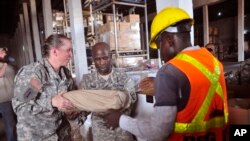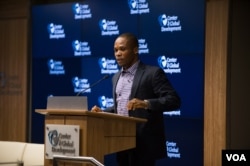Recent news reports indicate a drop in the number of new cases in the three countries hardest hit by Ebola: Guinea, Liberia, and Sierra Leone. Some treatment centers built with foreign aid are operating at a fraction of their capacity. Health care specialists say now’s the time to focus on revitalizing weakened health care systems.
However, falling economic growth caused by the outbreak has meant a large reduction in domestic funding for health care.
Private sector participation
US Senator Jeff Flake told participants at a recent panel discussion at the Washington-based Center for Global Development that donors must focus on restarting economies if these governments are to make national health care sustainable.
Senator Flake is the incoming chairman of the Senate Foreign Relations Subcommittee on African Affairs. He said investment in the Liberian economy will create conditions to facilitate what he called “top notch” health infrastructure that can manage infectious diseases before they become outbreaks.
For this, he said strengthening trade and stimulating the local private sector is essential.
"We need to ensure," he said, "whatever aid we provide involves private sector partners --those who can continue and sustain this activity after these projects are completed. I will make sure [US] aid is geared in that way. We also need to ensure that we will act nimbly to reprogram [funding made to successful projects that have made rapid progress] to areas that are more dire. There is no more important task than rebuilding the private sector."
US leadership essential
He said US leadership had been key to the effort to curb the virus. The Center for Global Development says so far, Washington has committed over $ 5 billion US dollars and several hundred thousand military personnel to help build treatment units, conduct lab testing, and perform civil engineering and logistical duties.
Many health specialists say prevention of future outbreaks means reform of the World Health Organization, which has been criticized by Senator Flake and others for its slow response to the crisis.
"To describe its response as lacking would be very charitable," he said. "Its director general Margaret Chan said 'like rest of the world, the WHO was slow to respond to the outbreak.' But the WHO is not like the rest of the world. That’s like me saying like the rest of country, the US Senate failed to pass legislation this year. It’s an excuse WHO should not get away with," he added.
"I believe the WHO would have better luck if it were to stop concerning itself with the overconsumption of energy drinks or the rate of global tobacco taxes, and stick with a mission more focused on the prevention of infect disease outbreaks.
World Health Organization reform
Senator Flake remains skeptical that WHO reforms would be effective in curbing future outbreaks. For example, he said one reform made in 2005 required WHO member states to report outbreaks of dangerous diseases – a regulation that he said had failed to prevent the Ebola epidemic.
WHO supporters say part of the problem is its structure – which allows national governments to influence the response of Africa’s regional WHO offices. The agency’s director general, Margaret Chan, said the work of the agency's office in Geneva was “limited to helping governments respond better, not sending an army of health workers to do it for them.”
The UN agency is expected to convene a meeting of its executive board soon to examine its response to Ebola, and to correct errors made in its handling of the crisis.
The road to good health
Other ideas for strengthening health systems came from Liberia’s Minister of Public Works, Gyude Moore.
He said eight months of rain per year and poorly maintained or non-existent roads prevent patients from reaching even well-equipped facilities like the Jackson F. Doe hospital in Tappita in Nimba County in central Liberia.
His solution to the problem is a project called Roads to Health which is co-sponsored by Last Mile Health and Partners in Health. The effort aims to guarantee transport between rural areas and health care facilities.
"As we build a health system after Ebola," he said, "we can build health centers where there were none before…but we have to build a health system that functions in the rainy season. To do that, physical access has to be part of the infrastructure."
Moore said the Liberian government is also developing a plan based on an idea used by the Clinton Health Access Initiative following the genocide in Rwanda – an effort that recruited more than 25 American medical schools to train doctors and nurses.
He said the Liberian plan would last 10 years and cost about $270 million US dollars to rebuild the health care system from top to bottom.
"At the bottom of the pyramid," said Moore, "are 25 community health workers, the first line of defense, who will be trained; the second level [of training will provide for] around 8,000 nurses, doctors, generalists, and at the tip of the pyramid are specialists. The program is being developed by the Ministry of Health and includes [strengthening] the Tubman National Institute of Medical Arts -- where nurses and physician’s assistants are trained – and medical schools.
"At different universities, especially the University of Liberia, we are also trying to form partnerships with up to 30 or so [US] medical schools so that on a rotating basis they have medical instructors in-country training Liberians."
Adapting infrastructure
Other proposed reforms will adapt infrastructure built to handle the Ebola crisis into the new health care system... Moore said five “forward logistics bases” used now to store chlorine, protective gear and drugs to fight the virus will become regional depots for other medicines needed by health care facilities.
And, Community Care Centers proposed to test patients for the virus will be made permanent – and be located near Ebola treatment centers and hospitals. They’ll act to separate those with the virus from patients who test positive for malaria, Lassa fever and other illnesses with symptoms similar to Ebola.
Revitalizing cooperation with donors
Moore said cooperation with donors also needs to be improved. For example, he said that it’s been hard to keep projects going due to an absence of monitoring consultants. They are often foreigners from countries like New Zealand and South Africa with travel restrictions on Ebola-stricken countries.
He also encouraged donors to help guarantee the sustainability of new health care infrastructure by using Liberian-owned construction companies.
"Almost all the partner-funded projects in the country came to a halt with Ebola because every one of them is done by an expat company," said Moore. "They invoked “force majeure” [emergency] and fled the country. Now, if those projects were designed so at least 20-30 percent of those works were sub-contracted to a local firm, some [projects] would have continued – because the locals have nowhere to go. "
The success of new health care systems also depends on financial accountability.
Gyude Moore said in Liberia, the Ministry of Finance will publish records from every institution involved in Ebola relief detailing how they spent their funds. He noted the UN agency established to fight the virus, the UN Mission for Ebola Emergency Response (UNMEER), is also going to establish a platform with a similar goal – to publish how much money has been spent, and the results of the efforts.








